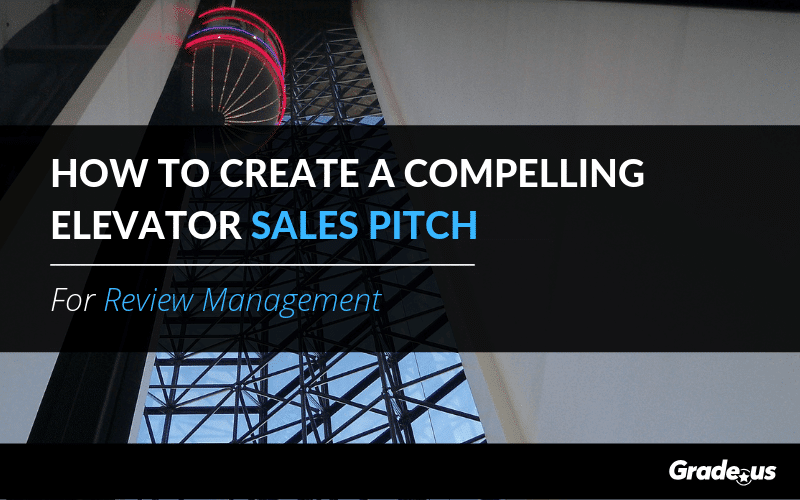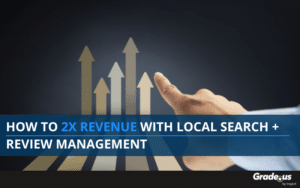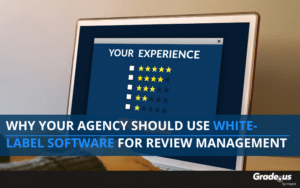Whether you're at a networking event, giving a presentation, launching a cold call campaign, or experimenting with your ad copy, delivering a compelling, lead-producing, elevator sales pitch for review management can make a huge impact on scaling your agency.
It all starts with an important question from your prospects:
"Why should I do it?"
This is the question clients want you to answer. When clients arrive at an agency's website (or any website for that matter), they typically have three questions.
1. Where am I?
2. What can I do here?
3. Why should I do it?
If you'd like to create a compelling elevator sales pitch for review management you'll need to answer these questions.
For some additional pitch insights beyond what this blog post covers, watch Garrett's webinar on creating a compelling review management sales pitch:
Your sales pitch isn't about selling
Surprise!
It's actually about optimizing your prospective client's thought sequence. Your prospects go through a predictable series of thought sequences. These thought sequences are present in every transaction, whether money is exchanged or not.
That's right, even if the offer is free.
When you share a product or service with clients they have a predictable response. They have a long list of questions, comments, objections and concerns. They have a pre-existing list of desires, goals, fears and frustrations.
Let's examine this further.
Your agency offers review management services. What's in your client's head?
- I’ve been contacted by 20 agencies. What’s so special about this one?
- I think they just want my money
- They’re so expensive, too expensive for me
- I don’t know the first thing about review management?
- What if they take my money and run?
- What will I get for my money, if anything?
- I’m barely making it as it is. How can this agency help me?
- They want my credit card, I don’t feel comfortable paying with a credit card
- How do reviews create revenue and cash flow for my business?
- I need X amount of leads, how will review management give me what I need?
- How many people have worked with you before?
- What are your credentials?
- Which industries do you serve? Which industries have you worked with before?
- How many clients do you have?
- How many clients in my industry do you serve?
- How will you handle conflicts of interest?
Here's the problem many agencies make in their elevator pitch. They do their very best to answer each and every one of these questions in their pitch.
It's completely unreasonable.
Why?
Our elevator pitch needs to focus on one thing and one thing only. If we're focused on optimizing thought sequences we shouldn't be focused on answering each and every question up front.
Here's why.
- Your prospect’s thought sequences are linear. This is both appropriate and necessary. When we go through the buying process we typically approach it in a linear fashion. First A then B then C.
- Attempting to cover each and every detail in your elevator pitch makes the thought sequence non-linear. This makes it hard to optimize your prospect’s thought sequences in a way that leads naturally to conversion. This breaks the natural flow your prospect’s buying sequence.
This is why we optimize thought sequences.
Why do we need an elevator sales pitch?
It's an opportunity for us to create attraction, interest and desire. If our pitch includes these three details, action naturally follows.
Here's the problem.
Most sales pitches don't work. Most of the time listeners (prospects) hear them and immediately begin to glaze over. Here's an example of a weak sales pitch.
"My name is Rick, and after years of working at other agencies, I'm jumping in and starting my own agency. If you know anyone who's looking for a local search and review marketing agency, I hope you'll send them my way!"
Weak.
So what's the problem here?
These weak sales pitches don't create attraction, interest and desire. This means no action. Alright then, how do you create a compelling elevator/sales pitch that produces attraction, interest and desire?
You include the right ingredients.
So, we know most sales pitches aren't compelling. What are the ingredients in a compelling sales pitch?
1. Psychological triggers: A mental emotional or social response to a specific queue or trigger. Prospects willingly drop their mental and emotional filters in order to hear or experience what you have to say.
2. Value proposition: A promise of value made to customers outlining how said value will be delivered, experienced and acquired.
3. Irresistible offer: a strong motivator that triggers action, outcomes and results.
The ingredients are simple but difficult to implement.
1. Psychological triggers
Triggers attract attention. There are lots of triggers you can use to attract customer attention naturally. But we'll be focused on a few specific concepts.
- Mystique
- Passion
- Alarm
- Prestige
- Power
- Trust
- Rebellion
Additionally, emotions like anger, fear, awe, joy, disgust and anticipation are all excellent motivators. These concepts and emotions can all be boiled down to one thing.
Contagion.
Psychological triggers are nothing more than germs for your brain.
It's science, here take a look.
The research shows psychological triggers are essentially mental, emotional, and social germs. These germs (and complementary states like limbic resonance) are the key to producing a specific action, outcome or result in people. And no, you don't have to rely exclusively on anger (though it is the most virulent).
2. Value proposition
You give value, customers give value. You provide customers with the mental, emotional, social and physical benefits they need, customers provide you with the mental, emotional and financial benefits you need.
Your Value Proposition consists of four specific ingredients.
1. Appeal: I want what you have to offer
2. Exclusivity: I can't get what you're offering anywhere else
3. Clarity: I understand what you're saying
4. Credibility: I believe you can/will do what you say
Your value proposition needs to meet each of these four criteria to qualify. As a result, most value propositions are weak. They focus on generic me too offers that are worthless to prospective clients. How would a compelling elevator pitch for prospects be reflected in your value proposition?
Here's a comprehensive webinar on the topic.
3. Irresistible offers
An irresistible offer is about one thing. Risk, namely, reducing risk. An irresistible offer is an extreme motivator that rapidly reduces the risk, fear, doubt, skepticism and rejection your prospects are more likely to experience.
An irresistible offer spurs action.
It can be temporary or permanent, small or large. The offer can be tangible or intangible, a niche offer available to a few prospects or a mainstream offer available to all clients.
The appeal is key here.
Your irresistible offer should reduce risk. You can do that in a variety of ways including:
- Free trial offers
- Bonuses
- Discounts
- Vanishing offers
- Countdown timers
- Urgency triggers
- Guarantees
- Warranties
- A compelling promise
- Prestige and/or social proof
- Exclusive offers (i.e. get our free product)
- Bundled opt-ins
- VIP/waitlist
- Contests and sweepstakes
- Takeaways
There are more, however, these tactics are helpful and common ways to create a compelling elevator/sales pitch. what does a clear, compelling pitch with the right ingredients look like?
Let's look at 10 examples:
1. We're XYZ agency! Our local search campaigns will flood your business with 5-star reviews. We'll give you a 30 percent lift in conversion or your campaign is free!
2. Our review management agency generates 20 percent more revenue for your business, per month. Find out how.
3. Rick here with XYZ agency. Our review management campaigns generate revenue in 2 months or less. The best part? The first 3 months of review management are free!
4. Our local search and review marketing agency will produce 1/3 more leads for your business than any other lead source you have. The first 3 clients to sign up for a 3-month trial will receive a free $2,500 advertising credit!
5. Our review management agency turned a $400K store into a $7.3 million dollar store in 38 months, using nothing but reviews. This quiz shows you how we did it.
6. Put XYZ agency to the test. We'll quadruple your 5-star reviews across each of your four major review profiles or your review management campaign is [free].
7. We're XYZ agency, the #1 rated review management agency in Raleigh, NC. We routinely 2x our client's leads and revenue. However, we only take on 10 clients at a time. We have 2 slots left. First come, first serve.
8. Our review management services increase your revenue, on average, by 1/3. Guaranteed or your money back.
9. Our last review management client had a 232 percent increase in foot traffic! Our campaigns produce 3x more revenue than other standard review management campaigns. Here's why our campaigns are better.
10. XYZ agency. We'll double your 5-star reviews in 10 days. The first 3 clients who contact us get a 90 percent discount.
Can you see the difference?
Why are these elevator sales pitches so much stronger? They have each of the ingredients we talked about. Psychological triggers, a strong value proposition and an irresistible offer.
This is how you create a high performing sales pitch.
Your sales pitch isn't about selling, it's about value
The focus needs to be centered around optimizing thought sequences. Your prospects go through a predictable series of linear thought sequences. Optimize these sequences and you optimize your sales pitch.
Simple and straightforward.
When you share a product or service with clients they have a predictable response. They have a long list of questions, comments, objections and concerns. They have a pre-existing list of desires, goals, fears and frustrations.
This is the question your clients want you to answer. When clients arrive they typically have three questions: Where am I, what can I do here, why should I do it?
Create attraction, interest and desire and conversions will inevitably follow.
About the Author
Andrew McDermott
Andrew McDermott is the co-founder of HooktoWin. He shows entrepreneurs how to attract and win new customers.









